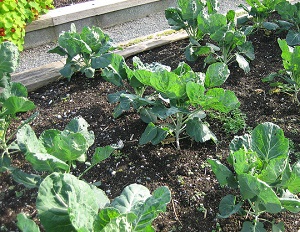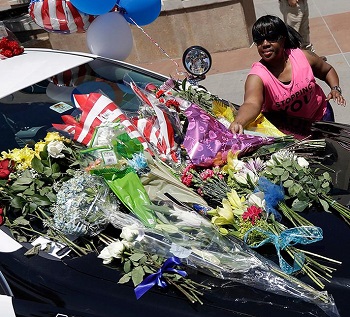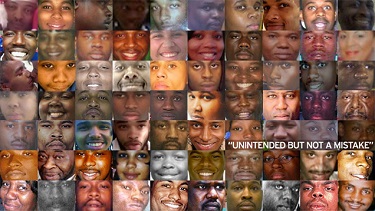Home » class prejudice (Page 2)
Category Archives: class prejudice
Save the Tree, but What About We?

By Bethany Ramirez
If all politics are local, there is currently a dust up about renovations to the park across the street from me. Plans include the removal of a tree that interferes with the community garden area. But the renovations were halted before they began because of a movement to save the tree.
And recently there have been some members of the community (certainly not most) who have made dismissive comments about the community garden in a way that makes me want to unpack some classism.
When Your Justice Collides with Ours
When we first came to look at this apartment, we were quite excited to discover that the community gardens were so close. We were even more excited to learn that there was already a fenced-in garden space in our yard, so we did not need to worry about the waiting list for a community plot. It had not been used for several years, so we invested a lot of time and money into cleaning out concrete and patching the fence.
However, our garden is struggling. Since the garden was last used, one of the trees has grown to cast shade over most of the space. And since the landlord does not want tenants wasting water, there is no water hooked up to the hose – a problem when we are approaching drought conditions.
In order for us to garden next year, either the landlord has to fix both of these problems, or we will have to use the community garden across the street. We rent. We cannot just move the garden location to somewhere else in our yard. Many neighbors don’t have space to garden at all. This is what community gardens are for. In fact, we are sharing our garden with friends from the next town who are on a waiting list for a community garden where it could take them years to get a plot.
There are class issues in the dismissive comments people have made about the community gardens. There are class issues in being able to afford to garden at all in the first place. And there are class issues in claiming a tree is more important than community gardens that have nowhere else to go. We talk a lot about how the poor can’t afford fresh produce, and we’re not letting them grow their own, either.
Bethany lives in Arlington, Mass., which, as of 2011, is 40% renter-occupied (source: http://arlingtonma.gov/home/showdocument?id=28425).
It Will Take Courage to End This Nightmare
by Denise Moorehead
As I listened to the news this week – first about still more unarmed black men dying at the hands of the police and then yesterday morning about 12 Dallas policemen being gunned down – I got angrier and angrier at the hypocrisy of the newscasters and pundits. To avoid being called cop haters or Black Lives Matter apologists, everyone spoke of their shock at what happened in Louisiana and Minnesota and then said, “but how could what happened in Dallas, happen?”
It is ridiculous, even offensive, to pretend that we don’t see the connection between the seemingly unending string of police shootings of black men as well as women and children – some found to be murders – and the very cruel actions of the Dallas shooter. The Dallas shooter left five families without fathers, husbands, sons, brothers, uncles and nephews. I feel truly, truly sorry for their families. It is not fair at all that these officers were randomly chosen to die in this revenge killing.
 To refuse to acknowledge the connection, however, is part of the reason that the gunman did what he did. He believed that no one in power is doing anything to stop the random killing of black men across the United States.
To refuse to acknowledge the connection, however, is part of the reason that the gunman did what he did. He believed that no one in power is doing anything to stop the random killing of black men across the United States.
I can never condone what the Dallas shooter did. I have a husband, father and nephew. But I do not pretend that I do not know why he believed his actions were rational. A 2015 study by the Washington Post found that unarmed black men were seven times more likely than whites to die by police gunfire. It is not getting better.
When Class and Race Collide
Police have very stressful jobs and must make life and death decisions in the moment. I’ve been told that when a policeman kills someone in the line of duty, that death stays with him or her forever. But when a string of officers kill 100s of black people each year and virtually none of the police are found guilty of a felony crime, the anger in the black community (and that of our allies) builds and builds – and eventually explodes.
And tinder has been added to the resulting raging fire by further provocations like the recent online sale by George Zimmerman of the gun used to murder Trayvon Martin, the rise of white supremacists (who have openly said Donald Trump’s rhetoric has helped their recruitment), and the continuing demonization of (especially poor and working) black people, especially young black men.
Those of us who care about ending classism and racism see the terrible irony in all of these killings – civilians and police. People from low-income and working-class backgrounds are being pitted against each other.
While black women, men and children of all classes are being harassed, assaulted and killed, a disproportionate number of those killed are less class advantaged. They are mostly low-income or working-class men hustling to make a dollar by selling CDs or cigarettes, driving old cars that have broken down, or in driving “suspiciously” through suburban neighborhoods.
While police in some big cities can make very good incomes, many do not. And most officers have class backgrounds that are not dissimilar from those they must now “police.”
About Class and Race from the Start
It is important to understand the class and race issues underlying the creation of today’s police forces. According to Eastern Kentucky University, the genesis of the modern police organization in the South is the “Slave Patrol,” created to return runaway slaves, deter slave revolts and maintain a discipline among slaves on plantations. Of course, only owning class people had plantations.
While black women, men and children of all classes are being harassed, assaulted and killed, a disproportionate number of those killed are less class advantaged.
In the North, police forces emerged from the hundreds, then thousands of armed men hired by business moguls to impose order on the new working class neighborhoods filling with immigrant wage workers. According to In These Times, Chicago businessmen donated money to buy the police rifles, artillery, Gatling guns, buildings, and money to establish a police pension out of their own pockets.
Speak Up and Show Up
The police were not created to protect and serve all classes. But we must speak up and show support for those police departments that are trying to be a force for all citizens. For example, the Camden, New Jersey, police department was completely revamped in 2013, which has since led to a significant reduction in crime. The department began emphasizing the importance of engaging with the community and forging relationships through one-on-one contact. According to the police chief, the department is focused on “building community first and enforcing the law second.”
Attend your local town meeting, or city council meetings, or aldermans’ meeting when there are police issues, and share the story of Camden and other departments that are trying to serve all classes and races.
And speak up and show up when we see wrong doing. In 2011, the Department of Justice found that the East Haven, Connecticut, police force had engaged in discriminatory policing against Latinos after a local priests’ videotapes helped trigger a federal investigation. Just three years later, federal compliance describe the turnaround within the department as “remarkable.” One person has the potential to make huge change.
Come together with other UUs and other justice-minded people to support:
- our own people of color organizations like Black Lives of UU
- BLM
- the NAACP
- and so many (below)
Refuse to become desensitized to the horror. Don’t change the channel, refuse to listen to the news or simply wring your hands. Talk to your friends and family when they say, “What can we do? It will never change.”
Educate yourself on class and race issues, and on the centuries-old fraught relationship between law enforcement and African-Americans. Refuse to refuse to believe black people when they talk about institutional racism in America.
Write letters to local, state and federal officials. Tell the Obama Administration and (especially) Congress that in a federal budget of $56 billion for police grants, it is a tragedy that only $70 million is allocated to improve police-community relations. (And much of that $70 million is for body-worn cameras, not community engagement.)
See the long list below of actions you can take and groups you can join and/or support.
And vote for people who can bring us together, not tear us further apart.
We know what it will take to end this nightmare. Now let’s summon the courage to do so.
More Reading/Listening
- We Already Know How to Reduce Police Racism and Violence
- This Country Needs a Truth and Reconciliation Process on Violence Against African Americans—Right Now
- Class and The Movement for Black Lives
- Can faith communities heal racial inequality? In Kansas City, a resounding yes
Organizations
- Black Lives Matter
- Brady Campaign to Prevent Gun Violence
- Campaign Zero – Solutions
- Color of Change’s petition calling for justice for Alton Sterling and Philando Castile
- Cut50.org (founded by Van Jones)
- NAACP
- Newtown Action Alliance
- Showing Up for Racial Justice (link to Black-led racial justice organizations you can support)
- The ACLU Mobile Justice App
Don’t Feed the Birds, Animals — or People?
When I learned about the latest indignity aimed at people living in persistent poverty, I had to ask myself, How did we dehumanize people living in poverty so thoroughly?
According to the National Coalition for the Homeless, well over 30 municipalities have restricted or banned sharing food with homeless people across the USA. Learning about this horror made me think about how (increasingly) rare it is for people from different class groups – and even with different class backgrounds – to interact. It becomes easy to view someone as “the other” when you see them only from afar – if you see them at all.
This thought brought back memories of one summer, during the mid-80s, when I saw how the myth of “other” began to crumble ever so slightly for one young man.
Creating Change
I worked on a grassroots campaign to pass a Consumer Utility Bill (CUB), which would have allowed consumers to contribute $1 to hire an expert to rebut Utility Company testimony during rate hike hearings. No one had organized Chelsea, home of the House Ways and Means Committee Chairman, Richie Voke. Ever.
Chelsea was the poorest city in Greater Boston, and one of the poorest in the state. It was expected that my crew would last a couple of hours, at most. But with youthful optimism and energy, I gathered all the multilingual canvassers who would accept my invitation, and off we went. Our assignment was to gather handwritten letters to deliver to Rep. Voke, as well as contributions of any amount (wink, wink).
As that one evening stretched into the second week, a young man in preppie attire balked at joining the crew. “Of course, it is easy for you. You’re working class.” Ummm.
Not exactly. I explained that I had grown up in a well-to-do suburb of Boston. Once upon a time, it was known as “one of the three Ws for wealth: Winchester, Weston, and Wellesley.” Moreover, I had graduated with honors from Harvard-Radcliffe College just a few years before, albeit on scholarship.
Well, perhaps he could give it a try, even though he was coming from an upper class family on the North Shore. He grudgingly came with us to Chelsea.
Opening a Window
Given his misgivings, we agreed to a check-in within the first hour. Turning the corner toward the designated meeting spot, I wondered what I would find. Up ahead, the young man stood quietly, as if trying to avoid attention. As he slid into the passenger seat, he was beaming. He waved a letter in his hand, and exclaimed, “You were right, Nancy. Working class people are just like us!” I did bite my tongue. His sincere amazement caught my breath.
This young man joined us for a second evening, and his enthusiasm contributed greatly to our campaign. All told, we visited Chelsea for two weeks, gathered 50 letters, over 250 signatures, and many memberships. It turns out that Chelsea is a city with many different neighborhoods, and socioeconomic classes. We even received a $50 contribution (well before the gentrification and condos of the new millennium).
Richie Voke responded immediately, rescuing the CUB and setting it up for passage. Unfortunately, in October that year, the U.S. Supreme Court struck down a similar provision, disallowing consumers to piggy-back communication in the utility statement envelopes. Alas. The campaign was successful in so many ways, for all of us.
Widening the Circle
Perhaps my own openness to all classes developed from the economic reality of my childhood in Winchester. Recently, my mother informed me that we would have had more money if she, as a widow with two small children, had applied for welfare. Instead, my grandparents assisted with budgeting (not actual funds) and my experience of socioeconomic realities was fluid and not particularly painful. I worked from the age of nine, but then so did many babysitters.
Whatever our response to the challenges of class discrimination, we cannot leave our cross-cultural encounters to chance. Class conversations are one way to begin deliberate steps toward widening our Circle of We, and ending classism.




